The death of 69 children in The Gambia early last month as a result of acute kidney injuries after taking cold and cough syrups produced by an Indian pharmaceutical company, Maiden Pharmaceutical, was very unfortunate. But it is also a call for vigilance in Nigeria to ensure that the harmful products, Promethazine Oral Solution, Kofexmalin Baby Cough Syrup, Makoff Baby Cough Syrup and Magrip N Cold Syrup, or any other do not enter into the Nigerian pharmaceutical market.
The World Health Organisation (WHO) in its ‘medical product alert’ issued on October 5, 2022, claimed that analysis of the four medicines had found “unacceptable” amounts of diethylene glycol and ethylene glycol. The two were identified as industrial chemicals toxic to people and could cause serious injury or death in children. From other reports, one of the chemicals, diethylene glycol, used as a cheap substitute for glycern, a sweet syrup, had caused mass poisoning in Nigeria.
Naira redesign: 3 governors under our radar over stashed cash – EFCC chair
Illegal mining: Police nab 8 with three trucks of marble in Kwara
In 2009, as many as 84 children died in Nigeria after taking a medicine for teething pain that contained the chemical. The product, My Pikin Baby Teething Mixture, was traced to an unlicensed chemical dealer in Lagos, who sold the syrup to the maker of the teething medicine. The company was shut down by the National Agency for Food, Drug Administration and Control (NAFDAC), and investigators had to pull off pharmacy shelves thousands of bottles of the tainted medicine.
Pharmaceutical drugs produced with diethylene glycol have caused deaths in several other countries. In 2006, it led to the death of 365 people in Panama; dozens of children in Haiti died about a decade ago after taking contaminated medicine for fevers. Last week in Indonesia, it was reported that government had to ban all syrup-based medications after an investigation into the deaths of 133 people, mostly children, from fatal acute kidney injury. According to the country’s health minister Budi Gunadi Sadikin, cough syrups containing diethylene glycol and ethylene, glycol had been found in some homes where some of the children had died.
The WHO said the chemicals, which are colourless, clear and syrup alcohols, are used for anti-freeze and other industrial applications, and are deadly if taken even in small quantities. The world health body said the effects of injecting them could include headache, abdominal pain, vomiting, diarrhoea and inability to urinate, and that the chemical could damage the liver, kidneys and central nervous system.
Though attention has been focused on Maiden Pharmaceuticals in New Delhi, and series of investigations are being conducted by WHO and Indian authorities into the company’s products, it is necessary for Nigerian authorities to extend vigilance beyond the specific Indian-made cold and cough syrups that have led to the global alert. From all indications, similar drugs manufactured by other pharmaceutical companies could contain the dangerous chemicals which are not healthy for human consumption.
Already, NAFDAC has issued an alert to Nigerians about the substandard products that caused havoc in The Gambia. In the alert, NAFDAC said, “The substandard products in this alert are unsafe and their use, especially in children, may result in serious injury or death. NAFDAC implores importers, distributors, retailers, and consumers to exercise caution and vigilance within the supply chain to avoid the importation, distribution, sale and use of substandard cough syrups. All medical products must be obtained from authorised/licensed suppliers. The products’ authenticity and physical condition should be carefully checked.”
However, it is not enough for NAFDAC to issue the alert. The drugs control organisation must activate its intelligence mechanism to ensure that cheap cold and cough syrups that contain diethylene glycol and ethylene glycol, not necessarily emanating from Maidens Pharmaceuticals in India, are mopped up and not sold to vulnerable Nigerians. The world is now so closely integrated technologically, demographically, and economically that dangerous items from guns and weapons and hard drugs to infectious diseases cross countries’ borders with ease.
From the ‘My Pikin’ tragedy in 2009, it was clear that Nigeria needs tighter measures to scrutinise pharmaceutical drugs imported into the country from other countries, like Pakistan and China. In Nigeria, there are all the necessary laws and regulations to prevent the import of prohibited pharmaceutical drugs, but the implementation of these laws, through the tightening of entry points has been lacking, leaving space for substandard and banned products to enter into the country. NAFDAC must be proactive.

 Join Daily Trust WhatsApp Community For Quick Access To News and Happenings Around You.
Join Daily Trust WhatsApp Community For Quick Access To News and Happenings Around You.


